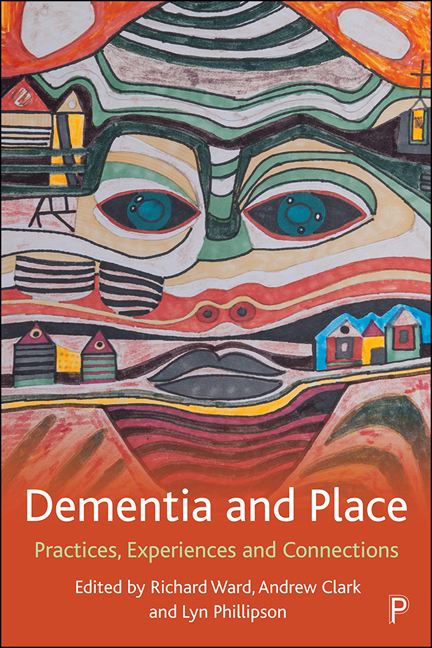Book contents
- Frontmatter
- Dedication
- Contents
- List of figures and tables
- Notes on contributors
- Acknowledgements
- 1 Introduction: Placing dementia
- 2 Understanding the meaning of neighbourhoods for people living with dementia: the value of a relational lens
- 3 Moving house with dementia
- 4 How do people with dementia manage problematic situations in public spaces?
- 5 Making and maintaining neighbourhood connections when living alone with dementia
- 6 My neighbourhood, my future ...?
- 7 Enabling the neighbourhood: a case for rethinking dementia-friendly communities
- 8 A conceptual framework of the person– environment interaction in the neighbourhood among persons living with dementia: a focus on out-of-home mobility
- 9 We’re known as ‘the girls’ around town: support, isolation and belonging for a lesbian couple living with dementia
- 10 Building community capacity for dementia in Canada: new directions in new places
- 11 The good, the challenging and the supportive: mapping life with dementia in the community
- 12 Growing back into community: changes through life with dementia
- 13 Dementia, tourism and leisure: making the visitor economy dementia friendly
- 14 Conclusion: Dementia emplaced
- Index
10 - Building community capacity for dementia in Canada: new directions in new places
Published online by Cambridge University Press: 13 May 2022
- Frontmatter
- Dedication
- Contents
- List of figures and tables
- Notes on contributors
- Acknowledgements
- 1 Introduction: Placing dementia
- 2 Understanding the meaning of neighbourhoods for people living with dementia: the value of a relational lens
- 3 Moving house with dementia
- 4 How do people with dementia manage problematic situations in public spaces?
- 5 Making and maintaining neighbourhood connections when living alone with dementia
- 6 My neighbourhood, my future ...?
- 7 Enabling the neighbourhood: a case for rethinking dementia-friendly communities
- 8 A conceptual framework of the person– environment interaction in the neighbourhood among persons living with dementia: a focus on out-of-home mobility
- 9 We’re known as ‘the girls’ around town: support, isolation and belonging for a lesbian couple living with dementia
- 10 Building community capacity for dementia in Canada: new directions in new places
- 11 The good, the challenging and the supportive: mapping life with dementia in the community
- 12 Growing back into community: changes through life with dementia
- 13 Dementia, tourism and leisure: making the visitor economy dementia friendly
- 14 Conclusion: Dementia emplaced
- Index
Summary
Introduction
Building Capacity for Meaningful Participation by People Living with Dementia is being undertaken in Canada under the umbrella of the federally funded Dementia Community Investment. This four-year Building Capacity Project (2019–23) models a bottom-up cross-sectoral approach to building and connecting community-based activities that provide meaningful opportunities for people with dementia to remain active and socially connected. In this chapter we examine how the project is designed to build practical knowledge from the ‘ground up’, working closely with people who are most directly affected by the issues (especially those with lived experience of dementia), and taking local context into account using methods of asset-based community development and developmental evaluation. Most importantly, this work is being carried out in two very different places, which is allowing us to both leverage our unique strengths and discover the common principles underlying successful approaches that can then be scaled up more broadly, including nationally. Ultimately, the aim is to create and share new knowledge about how this kind of ‘grass roots’ approach can lead to sustainable change at individual, community and institutional levels to promote social inclusion, raise awareness and reduce stigma around dementia.
Recognising the importance of place in this project, we begin by describing where the work is happening. This allows us to make explicit the significance of local contexts, be they geographic, social, economic, cultural or political, which are intrinsic to how we are developing and evaluating the various activities and programmes. We then lay out the principles and evidence that are guiding the project and go on to explain the project design: its overarching objectives, the approach we are taking to implementation and evaluation, and the project activities themselves, including those that are emerging in response to physical distancing measures being taken in the context of the COVID-19 pandemic.
Health and dementia in a Canadian context
Any conversation about dementia finds itself inevitably in the context of health care. In Canada, our health care system is federally funded and provincially administered. Each province oversees its own health insurance plan, which is accountable under the Canada Health Act to provide medically necessary hospital and physician care services to all eligible Canadians.
- Type
- Chapter
- Information
- Dementia and PlacePractices, Experiences and Connections, pp. 140 - 159Publisher: Bristol University PressPrint publication year: 2021

